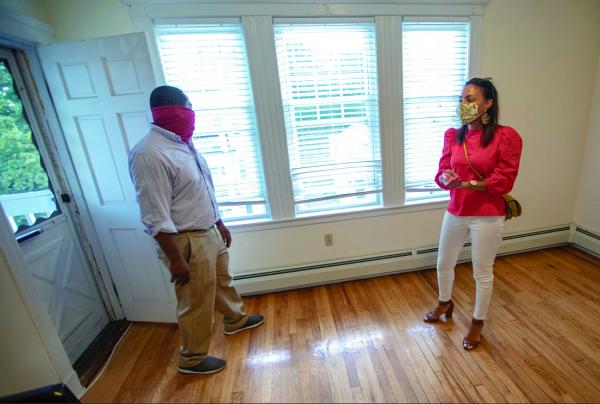September 3, 2020

Realtor Jonathan Viciere and condominium owner Mindy Wright wait for prospective renters to show up at the open house. Jesse Costa/WBUR photo
On a Monday evening in the last full week of August, a landlord held an open house for a two-bedroom condo rental in Dorchester. The price: $2,000 a month. Many renters would tell you that’s a steal in this city. But this unit has been on the market since July and it’s still empty.
These days, landlords said it’s not surprising to find a vacant apartment, something that would have seemed almost unthinkable at this time of year in summers past. Sept. 1 — the start of many new leases in the city — is usually marked by moving trucks lining and blocking Boston streets as students arrive and residents move into new digs.
But as with so many things, the date Bostonians affectionately refer to as “Allston Christmas,” may be different this year because of Covid-19.
“This is probably the longest we’ve had our place on the market,” said Mindy Wright, owner of the yet-to-be-rented Dorchester condo. “It usually rents pretty quickly.”
She said that in the decade she’s been renting it, she has usually been able to find a tenant in about two weeks.
“My husband and I have just been talking about it. Do we take in a tenant that’s less competitive as far as their application?” Wright said. “Do we make decisions around a lower credit score, or references that maybe are not as glowing just to get somebody in?”
She said the condo could be ideal for a student at the nearby University of Massachusetts Boston. But the school is relying heavily on online classes for this fall. That’s also the case for some other local colleges and universities.
The result is that fewer students are looking to rent across the city, according to the economist Joshua Clark, who analyzes rental markets for the real estate website Zillow.
“We have a whole new situation now,” he said. “The city of Boston and the metro area is usually getting ready right now for a flood of students to come on down to town and take up a huge amount of the demand and need a lot of supply that we see around the city.”
A smaller influx of students isn’t the only variable affecting demand. There’s also increased unemployment. And it’s having an impact on rental prices, according to Clark.
“Right now, if you are making money in Boston, if you are a lucky person who’s been able to keep their job — and I know that’s less common these days than normal — but right now is a great time to find deals,” he said. “The amount of promotions available right now are very great.”
Clark said Zillow doesn’t monitor vacancy rates, and the city of Boston doesn’t yet have data that would shed light on what this Sept. 1 will look like. But Clark said there are price declines — something that hasn’t happened since Zillow started monitoring Boston’s rental market in 2014.
And landlords are offering other incentives, such as allowing new tenants to move in for three months rent-free. “Extra little add-ons that are really reflecting higher vacancy rates than normal,” Clark said.
But even with some downward pressure on prices, Clark noted that Boston is still one of the most expensive rental markets in the country. So, if people were struggling before the pandemic, there’s little chance a slight drop in the rent or living rent-free for a few months would make much difference.
There may be another factor reducing demand for new leases this year: fewer people getting kicked out of their homes. Housing rights advocates in Boston said the months leading up to September are typically a time when some landlords try to get rid of non-paying tenants to make way for college students.
“In a normal year, April, May, June, July, August — those months in the housing justice movement are often referred to as eviction season,” said Helen Matthews with City Life/Vida Urbana, a grassroots organization that advocates for housing rights.
This year, she said “eviction season” is on hold because of the statewide moratorium on evictions. But Matthews said that doesn’t put people at ease. A recent Census survey indicated one in three Massachusetts renters are unable to pay their rent. That rental debt adds up. And Matthews said the fear is heightened for renters of color.
“One in every two Black renters in Boston said they had little to no confidence that they could pay their rent for August,” she said. “Thirty-nine percent of Latinx renters surveyed said they had little to no confidence that they could pay their rent for August.”
Matthews said when the eviction moratorium ends in October, Boston and the rest of Massachusetts could face an eviction crisis. There’s a bill making its way through the Legislature that would attempt to stabilize the rental market post-COVID-19. Until then, Bostonians are looking at an unfamiliar rental landscape.
Mindy Wright, the owner of the condo in Dorchester, said if no one moves in on Sept. 1, she’s hoping to find a tenant for September 15. If not, she said she and her family might be able to afford to go without a tenant for six months. After that, she’s not so sure. And Wright said she knows other landlords may not be able to wait that long.
This story was first published by WBUR 90.9FM on Aug. 28. The Reporter and WBUR share content through a media partnership.


